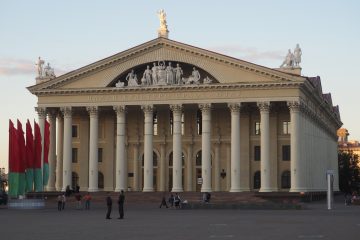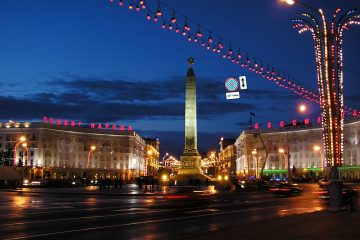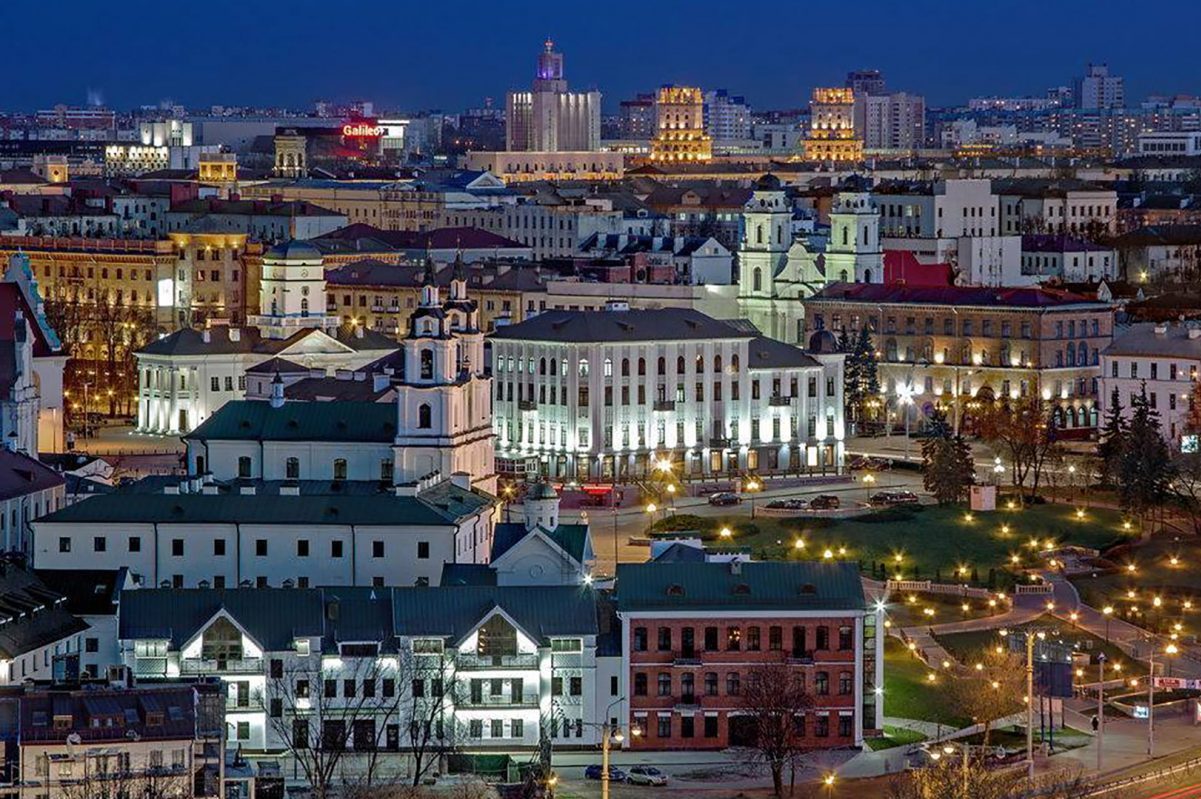Strategy report 2014
On the situation in Belarus and recommendations for active measures to be taken by the European Union and its Member States
I. Confrontation in Eastern Europe
The Russian Federation has failed to recognise the resignation of Ukrainian President Yanukovych, which was forced by the Maidan demonstrations in February 2014 after he – under Russian pressure – had refused to sign the Association Agreement with the European Union on the eve of the Summit of the Eastern Partnership in in Vilnius (21st November 2013), postponing it indefinitely. In response to the political turbulence in Ukraine, which led to Petro Poroshenko being elected the new President of the country at early elections on 25th May 2014, Moscow contravened international law by using military force to annex Crimea and, in Don-Bass, in Eastern Ukraine, Moscow has also established a separatist movement, which, despite fierce resistance from Ukrainian military forces, maintains separatist centres with Russian military support, creating artificial Russian interests within Ukraine in order to give Moscow political influence over the future development of the country. President Putin’s aim is the establishment of an independent Eastern Ukraine entitled “Novorossiya”. The successor states to the Soviet Union and several central eastern European states see the Russian Federation under Putin as a threat to their independence. The Kremlin’s Ukraine policy has, as a result of its violent approach to Ukraine and its annexation of Crimea, had a dangerous and dramatic impact on relations with the European Union and its Member States, as well as with the USA and, by extension, with NATO. It is hard to overestimate the extent of this damage. A large majority of the General Assembly of the United Nations condemned Russia’s annexation of Crimea as being in breach of international law. The new East-West crisis rocks to the core the position and future of an – as yet – independent Belarus: Contrary to Lukashenko’s expectations, the pro-Russian propaganda from Moscow is also having an impact amongst the Belarusian people. Lukashenko’s aim is, by proposing Minsk as the place of negotiation for the trilateral Contact Group Ukraine-Russia-OSCE, as well as for the most recent meeting of the Customs Union, EU and Ukraine, to maintain Belarus’ independence, whilst keeping its special relationship with Russia intact. Belarus has recognised the new political leadership of Ukraine without coming into direct confrontation with Moscow. Its economic dependence on indirect Russian subventions limits Belarus’ diplomatic freedom when dealing with Moscow, and the strict oppression of political opposition and independent civil society organisations in Belarus limits its options when dealing with the West, which insists on the release of all political prisoners and on free elections observed by both international and independent domestic election monitors. There has been no shortage of attempts to test the political and administrative waters, such as the negotiations on relaxation of the visa regime, which have, however, been blocked by Minsk for a long time. The brutal suppression of the demonstrations and the prosecution of Presidential candidates after the manipulated Presidential elections on 19th December 2010 continue to sour the atmosphere of relations between Belarus and the West. New protests from the opposition or even from the broader population against the Lukashenko regime could give Moscow a pretext for direct and forceful intervention. The economic perspectives of the country remain problematic: The state-controlled Belarusian economic model persists in its refusal to carry out the required modernisation. The country has a high trade deficit of 10%. This has led to currency reserves shrinking over the last year by 2 billion USD to around 6 billion USD, which is the equivalent of less than 1.5 months’ imports. The economy has a strong export focus, making it highly dependent on the economic developments in export markets, above all in Russia, which has been stagnant for a long time. Following the currency crisis of 2011, wages have now returned to pre-crisis levels. Real wage increases of 15-20% per year are, however, detached from any development in productivity. At the same time, inflation is high at 18%, which leads to high interest rates, which in turn restrict investment. Each uncontrolled relaxation of interest rates or disproportionate increase in wages, such as is often brought in before elections, can lead directly to a spiral of inflation and devaluation, just as happened in 2011. Lukashenko has traded the country’s entry into the Eurasian Economic Union, planned from 2015, against oil export tax concessions to the value of around 1.5 billion USD and a loan of 2 billion USD. Nevertheless, Russian reform of its oil taxation could again jeopardise this tax revenue for Belarus. In total, Russian support for the regime in Belarus in the form of low-cost energy supplies and loans runs to around 7.7 billion USD per year, making up around 10% of the Gross National Product of Belarus. In spite of this heavy dependence on Russia, Lukashenko shows great tactical acumen in negotiating from a position of strength and managing to extract such immense support from Russia. Strategically speaking, however, he is leading the country down an economic dead end because he has, for years now, been shying away from the necessary modernisation. If Russia were to break off its support, the Belarusian economic model’s inability to compete would cause it to implode within a matter of weeks or a few months.
II. Policy recommendations for actions towards Belarus and its civil society
Assuming there is no dramatic deterioration in the security situation in Eastern Europe as a result of the military activities in Ukraine, which are as yet confined to the region, the following possible courses of action can be presented for the approach to be taken by the European Union and its Member States, as well for civil society organisations within the EU:
1. The European Union and the Belarusian state given the current situation
In connection with the Russia-Ukraine crisis and Moscow’s expansionist strategy of dominance, Belarus is currently pursuing a policy of self-assertion, which makes it an important factor within Europe’s security and external relations framework. Neither the European Union nor the Member States want to ignore this aspect. Having a large number of contacts, including those at state level, can be considered essential. Given the existing obligation, binding for the entire European region since the Paris Charter of November 1990, to base state order on uninhibited human rights and not to degrade citizens to objects of arbitrary state policy, sanctions against state despotism towards its citizens and manipulated elections are an essential policy requirement in dealings with the illegitimate Belarusian state, as is the demand for the release of political prisoners, who are forced to live behind bars by manipulation of the judicial system. Agreements on the relaxation of visa policy are also desirable, as are – in some circumstances – unilaterally established relaxations in the area of visa regulation. The expansion of private economic freedoms and the establishment of legal security for citizens and corporations are extremely desirable commodities within the real social-economic situation in Belarus. The EU and the German Government must, however, not lose sight of the regional context when assessing decisions regarding sanctions against Belarus, in particular in dealing with the states in the GUS region which cooperate within the framework of the Eastern Partnership. The current sanctions against Belarus are correct and must be maintained so long as the country is holding political prisoners. In view of the radically deteriorated human rights situation in Azerbaijan – also an Eastern Partnership state – which is currently experiencing an unprecedented wave of repression and destruction of political and civil society opposition, and where nearly 100 political prisoners have already been sentenced, it is mandatory for the international community to make its stance clear. Credible reports speak of political bribery being used to prevent Baku-critical resolutions being passed by the Parliamentary Assembly of the Council of Europe. Without the European Institutions expressing criticism by distancing themselves politically from Baku, the sanctions against Belarus are bound to appear arbitrary and lack credibility. The European Union must not develop a reputation of applying double standards to the states in the European Neighbourhood. If the international sanctions against Belarus are to remain credible, then the international community must react to the widespread human rights violations in a state such as Azerbaijan. The reactivation of financial support mechanisms for Belarus by the international finance institutions – IMF, World Bank, European Development Bank should remain tied to the implementation of stabilisation measures within Belarusian budgetary and financial policy, as well as measures of liberalisation within the economic-industrial sector. Presidential elections are planned in Belarus for 2015. At present, a large portion of the Belarusian population sees Lukashenko as a “guarantee” for Belarusian independence from possible political or military intervention from Moscow – notwithstanding the fact that the country’s economic perspectives are not particularly promising. Advantages could emerge for Belarus as a result of economic and financial sanctions which have been imposed between Russia and the West. The opposition in Belarus is aiming to agree on a consultation process for determining a presidential candidate. Should this be successful, the question would remain whether the candidate would receive full support from all sections of the opposition. For some time, it has been common practice in authoritarian states in Eastern Europe – that is in the post-Soviet sphere – to eliminate opposition candidates as early as the registration phase, so that the choice presented to the public at elections becomes nothing more than a public process of confirming the power of ruling class, and even the semblance of a free election is no longer maintained.
2. Civil Society
Given the lack of freedom in cooperating with the authoritarian system of power, the central focus of our interest must be on the support of civil society, which is in a position to secure more and more economic freedom as the state is no longer able to provide state funds even to meet those public needs which it itself has defined – whether this be living wages and pensions, healthcare or the qualified education of young people. Supporting civil society in this way should also be made a priority when the structural regulations which the authoritarian system has put in place are aimed at making such support impossible. It is a mistake when European actors refrain from supporting civil society initiatives just because these initiatives have no chance of formal registration according to the arbitrary rules of the Lukashenko government. This provides a back-door for legitimising the regime, which is in no way deserved. Citizens learn to take responsibility for their lives into their own hands – one of the most important prerequisites for a free society as we understand it and for people being able to act according to their free will. When political participation is freely denied, as is the case in Belarus, civil society must organise itself in order to secure its livelihood using the means and methods available. One aspect of this, as well as professional qualification and entrepreneurial initiative, which exist in many cases, above all in the IT sector, is a critical approach to the transformation processes which have taken place thus far.
- Transformation studies
At the EHU (European Humanities University), which currently operates in exile in Vilnius, the concept of a “Centre for Transformation Studies” has been developed in cooperation with “Human Rights in Belarus” and with the help of funding from the German Marshall Fund of the United States. The Centre combines the necessary reforms in the area of state institutions with those in the economic and social order, and initiates and integrates the development of capable, competitive small and medium-sized enterprises which make use of the dual apprenticeship model for academic and practical careers. The transformation studies should provide cross-border experience for the development of self-supporting national economies and social structures, which can then lay the foundations for the establishment of pluralistic political orders and independent courts – this is as a result of recognising the need for such experience and not as a favour to foreign critics or financial sponsors.
- Foreign education
Of no less importance is, as was already emphasised in the previous strategy paper for 2013, the extension of the education opportunities in all fields which are offered by EU Member States to young people from Belarus. Their experience gained abroad gives them the chance to secure their livelihoods and to achieve a certain level of political freedom. Of all the various partners of Belarusian civil society, the German political foundations and the political foundations from other countries play a leading role. Highly significant is the provision of unbureaucratic help for citizens’ groups, as is successfully provided by the German Marshall Fund of the United States. Of no less importance is the provision of support in critical areas of society such as social work, employment support for young people and people of all ages who live with disability, as well as care for the elderly. These are areas in which state care in authoritarian states and societies is, for ideological reasons, particularly deficient. The political foundations should also promote the awareness of climate-related and environmental aspects of modern industry and consumer societies, and they should pay particularly attention to these issues in their work for and with Belarusian civil society. In conclusion, it can be said: Our state and civil society structures should make it their business to provide support to the processes of self-healing in Belarusian civil society, which was destroyed by the socialist system, and they should thereby also build up potential for a critical approach to the authoritarian regime – a task with both short and long-term impact. This concept of self-healing should enrich the work of the “Civil Society Forum” of the Eastern Partnership and also provide it the basis for its existence – independent of whether progress can be made in the other multilateral forums of the Eastern Partnership or not. This concept can only be “pushed through” if it is made a topic of discussion at expert conferences and political forums. Berlin, November 2014 THE BOARD Human Rights in Belarus
Hans-Georg Wieck Stefanie Schiffer Christoph Becker Stephan Malerius


